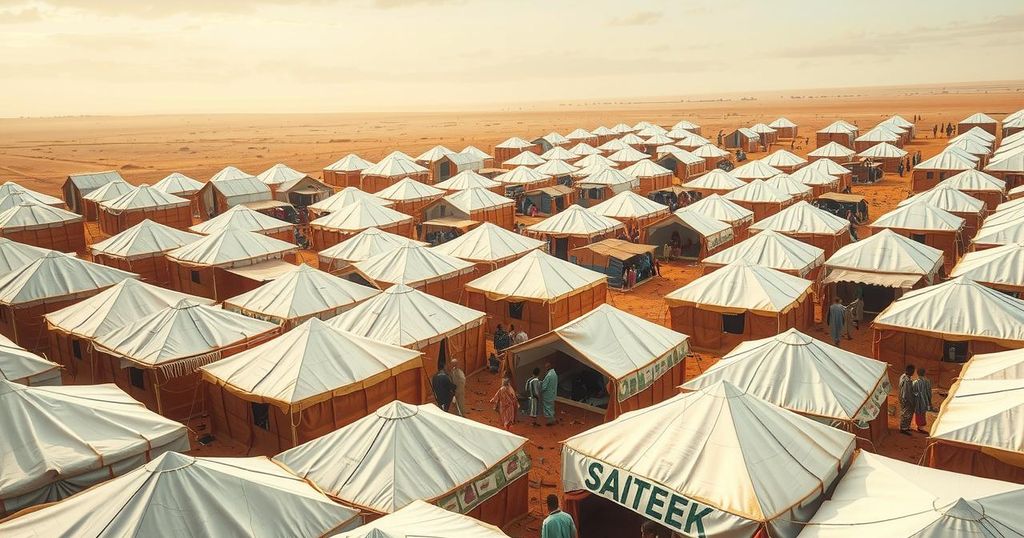Sudan Civil War Forces Thousands into Chad, Straining Refugee Camps

The flow of Sudanese refugees into Chad is overwhelming local camps, with increasing malnutrition among children. The ongoing conflict has displaced millions, straining Chad’s resources significantly. As the rainy season approaches, health officials warn of a potential rise in diseases, needing urgent international aid to support the overwhelmed system.
November 25, 2025 (BSS/AFP) – In the small town of Iriba, Chad, the situation is becoming increasingly dire as waves of refugees from Sudan’s ongoing civil war flood into already overcrowded camps. Nadjala Mourraou, clutching her frail two-year-old son Ahma, stands in a long line waiting for medical help. Tragically, Ahma is among many showing signs of severe malnutrition, a haunting reflection of their grim situation.
Mourraou, who fled from Nyala in Sudan’s South Darfur region last year, described the dire food situation they face at the Touloum refugee camp. “We’re suffering from a lack of food,” she stated, revealing that her and her son’s daily sustenance has dwindled to just a bowl of assida, a porridge made from sorghum. With the conflict between the Sudanese army and the paramilitary Rapid Support Forces (RSF) continuing, there are fears that these rations could further diminish.
The broader context is alarming. The fallout of this two-year conflict has led to more than 13 million people being displaced, with about three million seeking refuge outside Sudan. Chad, already one of the most impoverished nations, is now home to over 770,000 Sudanese refugees, according to the UN refugee agency, with more arrivals expected.
At the Touloum camp, which hosts around 25,000 to 30,000 refugees, medical staff are grappling with a rising wave of malnutrition cases. Dessamba Adam Ngarhoudal, a nurse working with Doctors Without Borders (MSF), noted troubling statistics: “Out of 100 to 150 daily consultations, nearly half of them deal with cases of malnutrition.” The situation escalated recently with the first reported infant death due to malnutrition at the local hospital, highlighting the crisis’s severity.
The capacity of the hospital’s malnutrition ward has been stretched beyond limits, and with soaring temperatures predicted to spike above 40 degrees Celsius (104 degrees Fahrenheit), health officials are bracing for worsening conditions. MSF nurse Hassan Patayamou expressed concern over the rising admissions, stressing the urgent need for assistance.
As the conflict persists without resolution, Chad’s government anticipates that the refugee count may approach one million. The UN High Commissioner for Refugees (UNHCR) warns that this influx would be untenable for the Chadian government alone. They are advocating for $409 million to alleviate the strain, yet, by late February, only a fraction of that goal had been met.
Djimbaye Kam-Ndoh, governor of the Wadi Fira province, which encompasses the overcrowded camp, emphasized the Chadian people’s longstanding tradition of supporting their Sudanese neighbors. However, he pointedly noted, “the population of the province has practically doubled,” underscoring the immediate need for substantial external support to manage this escalating crisis.
While humanitarian organizations express grave concerns over a potential cut in foreign aid—especially following decisions from the U.S. and European donors—the stakes for refugee lives remain high. Alexandre Le Cuziat, the deputy director of the World Food Programme (WFP) in Chad, warned, “Hundreds of thousands of lives are at stake” as about 25 million in Sudan face acute food insecurity.
With the rainy season fast approaching, health officials are also sounding alarms regarding potential outbreaks of diseases. Samuel Sileshi of MSF noted that preparations are underway for escalating cases of both malnutrition and malaria, exacerbated by the prevailing health risks such as measles in Darfur. This precarious situation, he concluded, necessitates urgent attention to avoid catastrophic outcomes, particularly for vulnerable children.
The humanitarian crisis in Chad is deepening as thousands of Sudanese refugees pour into the country amid an ongoing civil conflict. Severe malnutrition cases are rising alarmingly within refugee camps, exacerbated by limited food supplies and inadequate medical facilities. With the rainy season approaching, conditions threaten to deteriorate further, putting countless lives at risk. Without urgent international assistance, Chad, already struggling with poverty, faces an untenable burden from the influx of refugees.
Original Source: www.bssnews.net








